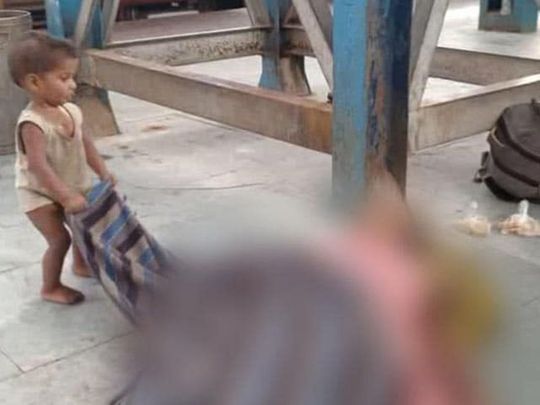
Video of toddler trying to wake up dead mother at railway station in Bihar goes viral
Yet another heart-wrenching incident of a migrant dying on train comes to light in India
by Lata Rani, CorrespondentPatna: Even as the horrible conditions of migrants returning home keep hitting the headlines, a heart-wrenching video of a child apparently trying to wake up his dead mother has shaken the masses. The video was apparently shot at the Muzaffarpur railway station in Bihar.
In the clip that has now gone viral on social media, the little child is seen pulling the cloth covering his dead mother lying on the railway platform and trying to wake her up. The boy, too little to understand that his mother was no more, comes near the corpse, pulls the cover up and then goes out before returning soon. He continues doing so until an older child drags him away.
“The little child doesn’t know that the cloth-sheet he is playing with is the shroud of his dead mother. This woman died after going without food and water for four days. Who is responsible for such deaths on trains?” asked Sanjay Yadav, political adviser to Bihar Opposition leader Tejashwi Yadav, who shared the video on his Twitter handle.
Extreme heat, hunger and exhaustion
Reports said the woman, a native resident of Katihar district in Bihar, had boarded the Shramik Special (Labourers’ Special) train at Surat in Gujarat last week, but died during the course of the journey due to extreme heat, hunger, exhaustion and dehydration. Finally, her body was taken out of the train by the family members accompanying her and laid on the railway platform. It was then that the video was shot on May 25.
“The woman had boarded the Shramik Special train at Surat and was on way to Katihar, but she died midway. She was sick,” Nand Kishore Singh, the station house officer at Government Railway Police, Muzaffarpur, told Gulf News over the phone.
He said he was shattered to see the video, adding that the authorities had sent the body to her home by arranging an ambulance. According to him, some family members were also accompanying the woman on the train journey, though those who shot the video didn’t record their presence.
Inordinate delays
Deaths of migrant workers travelling on Labourer Special trains due to hunger, lack of water, heat and exhaustion have been in the news for some time now. In the past two days, as many as seven migrants and their children have died during the train journeys. Adding to their woes are the inordinate delays caused due to the circuitous routes that many of these trains are often taking to arrive at their destinations, owning to congestion of rail traffic on their usual routes.
On Tuesday, two such deaths were reported from two separate Shramik Special trains reaching Bihar. One of the victims was identified as Saroj Kumar, 45, who was returning from Surat along with his brother. His condition deteriorated as the train entered Bihar and finally he collapsed when the train reached Gaya station. Later, the body was taken off the compartment at Patna station and sent for post mortem.
Another migrant worker, identified as Lal Babu Kranti, returning to his home town Darbhanga, died on another Shramik Special train while travelling from Surat. His family members alleged that the victim had died of hunger and thirst as the train took 80 hours, instead of the scheduled 58 hours, to reach its destination.
“We are not aware of deaths due to hunger and thirst of returning migrant labourers on trains. Railways is providing enough food, water and all facilities to the migrants returning by these trains,” East-Central Railway’s deputy general manager Alok Kumar Jha said.
More than 1.5 million migrant workers have returned to Bihar by Shramik Special trains so far. Many have fallen sick due to lack of food and water while on the trains and a heat wave sweeping large parts of northern and western India.